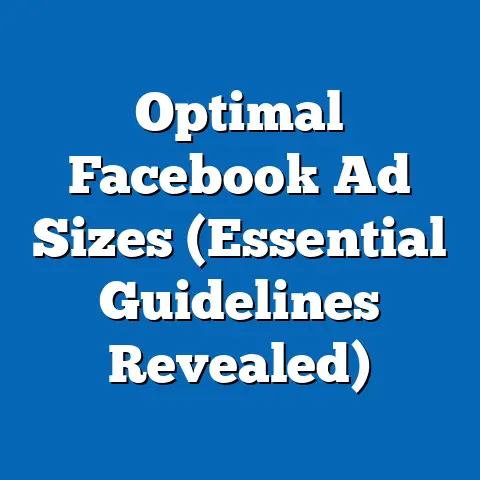Maximize Deductions from Facebook Ads (Tax-Savvy Tips)
Just like selecting the perfect flooring requires a blend of art and strategy, optimizing your Facebook ad spend for tax deductions demands a similar approach.
Think of it this way: flooring is more than just covering a surface; it’s about creating a space that’s both functional and aesthetically pleasing.
Similarly, Facebook ads are more than just throwing money at a platform; they’re about strategically investing in your business’s growth.
And just as thoughtful flooring choices can increase your home’s value, savvy tax planning around your Facebook ads can significantly improve your business’s financial health.
In this article, I’ll guide you through the ins and outs of maximizing your tax deductions from Facebook advertising.
We’ll explore how to treat Facebook ads as a legitimate business expense, the importance of meticulous record-keeping, and the specific costs you can deduct.
We’ll also delve into advanced tax strategies and common pitfalls to avoid, ensuring you’re not leaving money on the table.
Get ready to transform your understanding of Facebook ads from a simple marketing tool to a tax-optimized asset!
Understanding Facebook Ads as a Business Expense
Let’s start with the basics: what exactly qualifies as a business expense when it comes to Facebook advertising?
The IRS defines a business expense as anything that is “ordinary and necessary” for running your trade or business.
In simpler terms, it’s something common and helpful in your particular industry.
Think about it: every business needs to market itself.
And in today’s digital age, Facebook advertising is often a key component of that marketing strategy.
Therefore, Facebook ad spend generally falls squarely within the “ordinary and necessary” category, making it a legitimate business expense.
The IRS provides broad guidelines, and it’s up to you to demonstrate that your expenses are directly related to your business.
This means keeping records and being able to explain how your Facebook ads contribute to your business goals, whether it’s generating leads, driving sales, or building brand awareness.
Consider these examples of how different types of Facebook ads fit into the expense category:
- Boosted Posts: These are the simplest form of Facebook advertising, where you pay to increase the reach of an existing post.
If the post promotes your business or a specific product/service, the cost of boosting it is a deductible advertising expense. - Carousel Ads: These ads allow you to showcase multiple products or services within a single ad unit.
The costs associated with creating and running carousel ads, including graphic design and ad spend, are deductible. - Video Ads: Video is a powerful medium for engaging potential customers.
The expenses related to creating, editing, and promoting video ads on Facebook, including production costs and ad spend, are deductible.
Takeaway: Facebook advertising is a legitimate business expense, provided it’s ordinary and necessary for your business.
Keep records and be prepared to explain how your ads contribute to your business goals.
Keeping Accurate Records
This is where many businesses stumble.
You can’t just claim deductions without solid proof!
Maintaining accurate records for all your Facebook ad expenditures is absolutely crucial for maximizing your tax deductions.
Think of it as building a strong foundation for your tax claims.
So, what does “accurate record-keeping” look like in practice? Here are some best practices:
- Screenshots: Take screenshots of your Facebook Ads Manager dashboard, showing the ad campaigns you’re running, the target audience, and the ad spend.
These screenshots serve as visual proof of your advertising activities. - Invoices: Download and save all invoices from Facebook for your ad spend.
These invoices provide a detailed breakdown of your charges and serve as official documentation. - Advertising Reports: Regularly generate and save advertising reports from Facebook Ads Manager.
These reports provide valuable data on ad performance, including impressions, clicks, conversions, and cost per result.
This data can help you justify the effectiveness of your ad spend.
Facebook Ads Manager itself is a powerful tool for tracking your spending and performance.
It allows you to monitor your ad campaigns in real-time, analyze key metrics, and generate detailed reports.
Familiarize yourself with the Ads Manager interface and use it to your advantage.
There are also excellent accounting software and tools available that can help you organize your ad spend records.
Programs like QuickBooks and Xero allow you to categorize your expenses, track your income, and generate financial reports that make tax preparation much easier.
You can often integrate these programs directly with your bank accounts and credit card statements, automatically importing your Facebook ad expenses.
My Experience: I once worked with a client who lost out on significant tax deductions because they hadn’t kept proper records of their Facebook ad spend.
They had been running ads for months, but they couldn’t provide any documentation to support their claims.
This experience taught me the importance of emphasizing record-keeping from the very beginning.
Takeaway: Meticulous record-keeping is essential for maximizing your tax deductions from Facebook ads.
Use screenshots, invoices, advertising reports, and accounting software to document your ad spend and performance.
Identifying Deductible Costs
Now, let’s get into the specifics of what costs associated with Facebook ads are actually eligible for deductions.
It’s not just the money you spend directly on running the ads themselves.
There are several other related expenses that can also be deducted.
Here’s a breakdown of specific costs you can typically deduct:
- Advertising Fees: This is the most obvious one – the actual money you spend on running your Facebook ad campaigns.
Whether you’re paying per click, per impression, or per conversion, these fees are deductible. - Creative Development Costs: Creating engaging and effective Facebook ads often requires professional help.
The costs associated with graphic design, video production, and copywriting for your ads are deductible.
This includes payments to freelancers, agencies, or in-house staff. - Consulting Fees for Marketing Professionals: If you hire a marketing consultant or agency to help you develop and manage your Facebook ad campaigns, the fees you pay them are deductible.
This includes strategic planning, audience targeting, ad copywriting, and performance analysis. - Software Subscriptions for Ad Management: Many businesses use third-party software tools to manage their Facebook ad campaigns more efficiently.
These tools offer features like automated bidding, A/B testing, and advanced reporting.
The subscription fees for these software tools are deductible.
Now, let’s talk about the concept of mixed-use expenses.
This refers to situations where an expense is used partly for business and partly for personal purposes.
For example, if you use your personal computer to create Facebook ads for your business, you can only deduct the portion of the computer’s cost that is attributable to business use.
To allocate mixed-use expenses appropriately, you need to keep track of how much time you spend using the asset for business versus personal purposes.
For example, if you use your computer 60% of the time for business and 40% of the time for personal use, you can deduct 60% of the computer’s depreciation expense.
Practical Example: Let’s say you hired a graphic designer to create images for your Facebook ads, and you paid them $500.
You can deduct the full $500 as a creative development cost.
However, if you also used those images for personal projects, you would need to allocate the cost accordingly.
Takeaway: You can deduct not only the direct costs of running Facebook ads but also related expenses like creative development, consulting fees, and software subscriptions.
Be mindful of mixed-use expenses and allocate them appropriately.
Tax Strategies for Maximizing Deductions
Now that you know what you can deduct, let’s explore some advanced tax strategies that can further enhance your deductions.
These strategies require careful planning and may benefit from the guidance of a tax professional.
Here are some strategies to consider:
- Timing of Ad Expenditures: You can strategically time your ad expenditures to maximize your deductions in a particular tax year.
For example, if you anticipate having a high-income year, you might accelerate your ad spending before year-end to increase your deductions and reduce your taxable income.
Conversely, if you anticipate having a low-income year, you might postpone your ad spending to the following year. - Utilizing Losses from Prior Years: If your business incurred losses in prior years, you may be able to carry those losses forward to offset current income.
This can significantly reduce your tax liability.
Consult with a tax professional to determine if you’re eligible to carry forward losses and how to apply them to your Facebook ad deductions. - Structuring Business Entities: The way you structure your business entity (e.g., sole proprietorship, LLC, S-Corp) can have a significant impact on your tax liability.
Different business structures offer different tax benefits and deductions.
For example, S-Corps may allow you to deduct certain expenses that are not deductible for sole proprietorships.
Consult with a tax professional to determine the best business structure for your specific situation.
The benefits of working with a tax professional cannot be overstated.
They can provide personalized advice based on your unique circumstances, help you identify additional deductions and strategies, and ensure that you’re complying with all applicable tax laws.
My Insight: One of the most valuable lessons I’ve learned is the importance of proactive tax planning.
Don’t wait until the last minute to think about taxes.
Start planning early in the year and regularly review your strategies with a tax professional.
Takeaway: Explore tax strategies like timing ad expenditures, utilizing prior year losses, and structuring your business entity to maximize your deductions.
Working with a tax professional can provide personalized guidance and ensure compliance.
Common Mistakes to Avoid
Finally, let’s highlight some common pitfalls that business owners encounter when trying to deduct Facebook ad expenses.
Avoiding these mistakes can save you time, money, and potential headaches with the IRS.
Here are some common mistakes to watch out for:
- Failing to Keep Receipts and Proper Documentation: As I’ve emphasized throughout this article, proper documentation is essential.
Failing to keep receipts, invoices, and advertising reports can make it difficult to substantiate your deductions and may lead to audits. - Misclassifying Personal Versus Business Expenses: It’s crucial to distinguish between personal and business expenses.
You can only deduct expenses that are directly related to your business.
Mixing personal and business expenses can raise red flags with the IRS. - Ignoring the Importance of Tracking Ad Performance Metrics: Tracking your ad performance metrics is not just about optimizing your campaigns; it’s also about justifying your ad spend to the IRS.
If you can demonstrate that your Facebook ads are generating a positive return on investment, it strengthens your case for deducting those expenses.
These mistakes can lead to audits or missed financial opportunities.
An audit can be time-consuming, stressful, and potentially costly.
Missing out on deductions means paying more in taxes than you legally owe.
Real-World Example: I know of a business owner who tried to deduct the cost of a family vacation as a business expense, claiming that they were “researching” their target market while on vacation.
This is a clear example of misclassifying a personal expense as a business expense and is likely to raise red flags with the IRS.
Takeaway: Avoid common mistakes like failing to keep records, misclassifying expenses, and ignoring ad performance metrics.
These mistakes can lead to audits or missed deductions.
Conclusion
Just as the right flooring can transform a space, strategic ad spending and tax-savvy practices can significantly enhance your business’s financial health.
By understanding the rules, keeping accurate records, and implementing advanced tax strategies, you can maximize your deductions from Facebook ads and reduce your tax liability.
Remember, Facebook advertising is a legitimate business expense, but it’s up to you to demonstrate that it’s ordinary and necessary for your business.
Keep meticulous records of your ad spend, creative development costs, consulting fees, and software subscriptions.
Explore tax strategies like timing ad expenditures and structuring your business entity to further enhance your deductions.
And most importantly, don’t hesitate to seek professional guidance from a tax advisor.
They can provide personalized advice based on your unique circumstances and ensure that you’re complying with all applicable tax laws.
Now, it’s time to take action.
Implement the tips shared in this article to ensure you’re maximizing your deductions from Facebook ads effectively.
By doing so, you’ll not only optimize your marketing efforts but also improve your business’s financial well-being.
Just like a well-designed floor, a well-managed Facebook ad strategy can provide a solid foundation for your business’s success!






